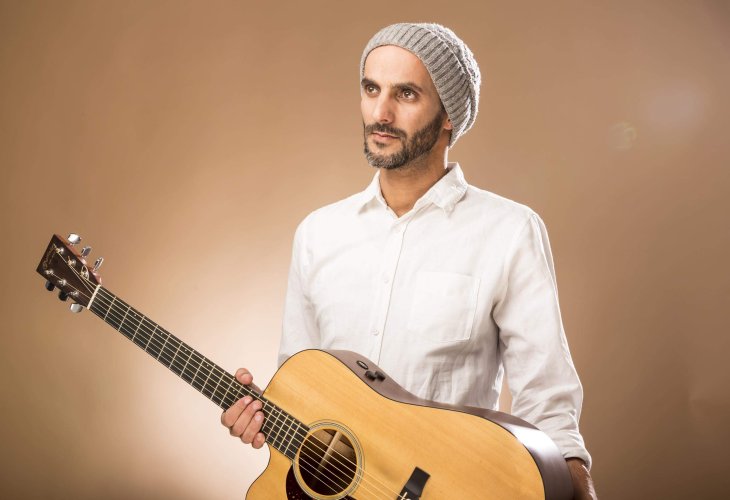Joseph Nativ: "When Grandpa Passed Away - Suddenly My Entire Childhood Came Back to Me with a Bang"
Joseph Nativ is one of the prominent voices in the new wave of Jewish music. On the occasion of his new song release, he shares about his attempts to detach from screens, the creative block he faced in recent years, and his spiritual journey back to faith.
 Joseph Nativ (Photo: Kfir Bulotin)
Joseph Nativ (Photo: Kfir Bulotin)In an era where studies on the harmful effects of technology continue to be published and frighten us, amidst the hustle and bustle of daily life and the addiction to screens that many of us find ourselves in, it's refreshing to meet an artist who refuses to play along. "We don't have to let the world control us," says Joseph Nativ, an active artist in the new Jewish music scene. "There are many distractions, and we should consider what is worth improving and refining within ourselves. We are living in an age where it is very difficult to quiet everything around us and be in tune with ourselves. The screens are constantly stealing us away from ourselves, the pace has become so fast, and this somewhat turns us into machines."
The Secret of the Hidden Songs
Nativ has an explanation for his decision to disengage from the media: "I realized that if I don't learn to disconnect from these tools, if I don't stop with these escapisms, I'll simply get sucked in and lose myself. We have infinite depths within us just waiting to be discovered, but we are constantly diverted from them. I have a strong desire to preserve my space and time, where I can discover myself as an artist, a servant of Hashem, a family man, and in general, as Joseph. Rabbi Nachman of Breslov is a great gift that came to the world, and he says that a person should respect their time, invest it in what matters. We must not let the world confuse us."
And how does your musical activity influence this?
"I think when a person creates, they need to be connected to themselves, and that is very important for creation. To have as few external distractions as possible, and also to allow oneself to take the necessary time for the creative process. For example, the third and latest album I released, 'The Day Will Come,' came out after several years of work. It took time. Some of the materials I had were not good enough in my view, and it was a period of a lot of writing and attempts. The investment paid off, and eventually, I hit the right frequency, and songs came out that I really loved, like 'Love for Free,' 'That's You,' 'You Lack Nothing,' and more. I knew they were songs that would help me break out, and indeed, they were broadcasted on the radio and thanks to them I got invitations to perform.
"When you create, it often takes time. Until today, I have released three albums, one from my secular period that almost nobody knows, and it is amazing in my eyes. I have released less than forty songs in total, but I have more than two hundred. I have a dream to release an album of my hidden songs; there are people who will most connect with these songs."
Like Leaving the World
In addition, alongside his remarks about his hidden songs, Joseph has quite a bit to say about his songs that have come out into the world. "In the past two years, I felt like I had a creative block," he shares openly. "I wrote and composed a little, but I felt it wasn’t it. The pandemic that hit the world hit me too, and halted my creativity. These last two years were not easy for me. My career was on hold. Musically, I mainly produced songs for amazing artists, but my music sat aside. That being said, there was also a blessing in that. I did more natural things that made me feel good. I took time to disconnect for a moment, to put aside the pressure, left a certain manager I was working with, and decided that if I don't have good songs, then I won't release songs for now. Apparently, I needed to relax, and in some respects, to be somewhat reborn.
"Moreover, the pandemic brought me a lot of good too. Hashem brings trouble to Israel so that they will run to Him. Hashem gives us signs to draw us closer to Him. It’s clear to me, for instance, that we need to unite around the matter of prayer, of togetherness. Our nation is the holiest and most precious thing there is. Western culture tries to teach us alienation, career, and material, but Hashem doesn’t like that. During the pandemic, I suddenly met new friends, and my heart opened. Suddenly I felt that my heart wanted to pray for Clal Israel, for the Land of Israel. New connections and things opened up for me, and after going through that, I come to creation from a much more genuine place."
 (Photo: Kfir Bulotin)
(Photo: Kfir Bulotin)How do you keep your career and connection with the audience from fading during such a time?
"The market is flooded with artists and good materials, it’s really not easy. You constantly have to keep your originality; it's very tempting to do things similar to others' works and miss your true authentic self. During the pandemic, I continued to write and release although it was somewhat challenging, and today I feel that the songs released during this time have great value. I believe they are slowly being discovered and that's how you build an audience, I strongly believe in persistence and the journey. It is important for me to reach as large an audience as possible, so of course, I try to communicate with it and make music as updated as possible, but also, of course, to maintain my uniqueness. I don’t always second-guess if a song I love and want to release is updated enough, commercial, etc. I allow myself to flow for my own sake and to immortalize what truly happens to me even if it won't be an amazing success.
"Within this, I can share that my grandfather recently passed away, and I wrote a song in his memory. When it happened, suddenly my entire childhood came back to me with a bang; I felt that only when he passed did I discover the connection we had and that I am so much like him. Another song I released is called 'Voice of My Beloved,' and it speaks about my desire to leave behind all the excuses and easy paths that I often escape to, and really draw closer to Hashem and myself and be true with myself. It's a song I really love, and I’m waiting for several good songs to collect, and then release them in an album."
To Impact the Entire World
You mentioned an album, but it seems like albums have somewhat become obsolete. Today artists mainly release singles.
"Yes, that’s quite true, and there are pros and cons to that. On one hand, it lightens the issue because an album is a heavy and big thing, but on the other hand, an album often has an entire story. It’s like diving into a long project, a journey in which many surprises are discovered. Many songs I produce in my home studio located in an apartment I rent in Harish, and it's a quiet place for creation that I always love returning to. There’s something spiritual in working alone, it's like exiting the world for a few hours, but that solitude can also close you off too much and become rigid, and indeed, recently I’ve been working with producer Avi Tal and see it as a great blessing. He helps me a lot to step outside myself, to present the materials to an external ear and work together, I learn a lot from it and enjoy making music with him."
Beyond the musical occupation, how do you view the spiritual processes you are going through as a ba'al teshuva?
"For me, teshuva is something that never ends. At the beginning of my teshuva, I dressed like a Charedi, grew a beard and side locks, and then removed them. I had a desire to change clothes and dress more nicely like before. But at the same time, I certainly didn’t distance myself from Hashem; on the contrary, I grew closer. Rabbi Nachman says you must constantly search, rise from level to level. Returning to teshuva and thinking you’re done is called falling asleep. You need to renew yourself constantly and return to sincerely seek Hashem, to slowly peel away layers, and seclusion can really help with that. There are many layers even in teshuva. Returning to teshuva isn’t a one-time thing; it’s a lifetime. Sometimes we realize we've done teshuva before people, but not before Hashem. We must remember that the descents are for the purpose of ascent. In descent, you peel off pride and layers, and all this is to gain new tools."
Regarding teshuva, do you believe your songs help people draw closer to Hashem?
"Successfully drawing someone closer to Hashem is hard, but I believe the songs indeed help in this. And of course, I am very grateful for that to Hashem. Whoever decides to draw closer to Hashem embarks on a difficult journey, but Hashem accompanies everyone who comes toward Him. Whoever wants to draw close to Hashem—everything is open before them. They can reach the highest levels there are. Everyone is in the category of a tzadik, possessing a unique goodness their friend does not, and this point needs to be revealed. I try to work on seeing the good in everyone, and it greatly affects me, my creation, and I believe also the entire world."

